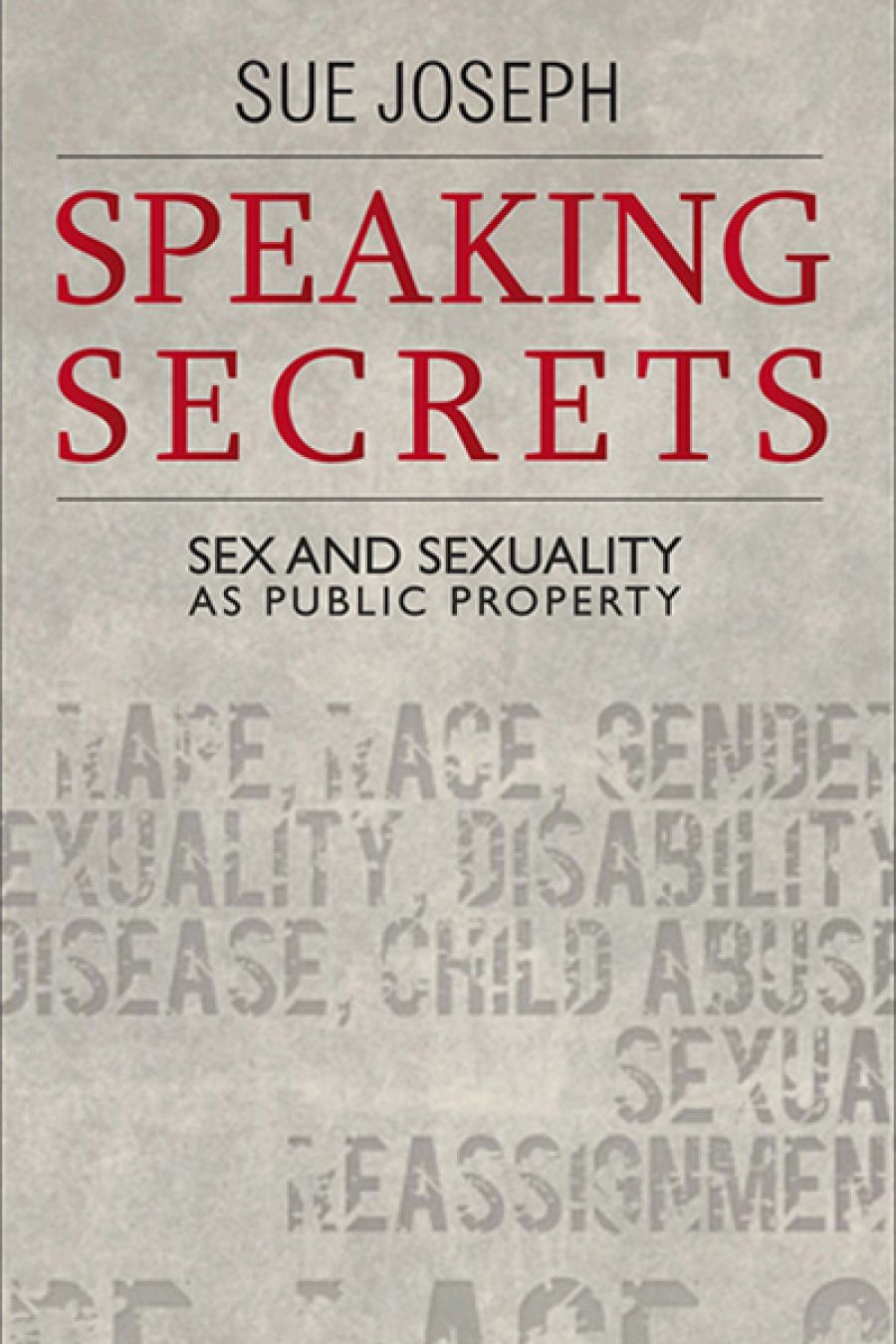
- Free Article: No
- Contents Category: Society
- Review Article: Yes
- Online Only: No
- Custom Highlight Text:
In Speaking Secrets, academic and journalist Sue Joseph looks at what happens when sex becomes ‘public property’, and interviews a range of Australians who have had often traumatic sex and sexuality-related experiences aired to a wide audience through the media. Some of her interviewees are well known, others are not. Several discuss their experience of sexual abuse, either as a victim or as the relative of a victim. There is an interview with David Cunningham, the Greens candidate who has argued that ‘disabled people need sex lives’. Cunningham (who has cerebral palsy) has stated that people with disabilities should have access to sex workers. There are interviews with the transgender lawyer Rachael Wallbank and the Reverend Dorothy McRae-McMahon, a Uniting Church minister who came out as a lesbian in 1997. In one amusing moment, McRae-McMahon finds herself discussing anal sex during her conversation with Joseph in a Sydney café.Speaking Secrets is situated in the field of literary journalism. Reading Joseph’s evocative prose, the reader almost feels as if he is eavesdropping on the interviews. Still, the author leaves much to the imagination (I will discuss one instance of this). There is not a cliché or a superfluous word in the book.
- Book 1 Title: Speaking Secrets
- Book 1 Subtitle: Sex and Sexuality as Public Property
- Book 1 Biblio: Alto Books, $24.95 pb, 229 pp, 9781921526183
Admirably, Joseph avoids passing judgement on the lives and opinions of her interviewees. She does, however, disclose moments of discomfort between herself and some of her subjects. Witness her interview with Liz Mullinar, a former casting agent and a survivor of childhood rape. This interview takes place at Mayumarri, the retreat that Mullinar established for other abuse survivors. In the following passage Joseph describes her conversation with Mullinar as having been uncomfortable for both parties:
I feel that Liz Mullinar hadn’t really wanted to do this interview but did, for the sake of the cause. And Mayumarri. And breaking the silence.
I realise I hadn’t wanted to do it either. As soon as I arrived (at Mayumarri) I had felt like an intruder.
But did because she agreed to it.
And I am not sure if that is reason enough.
In such passages Joseph distances herself from the kind of journalism where a faceless and/or pseudo-objective reporter sits there silently as his or her interviewees disclose personal information. I have always regarded this sort of journalism as intellectually dishonest. As Joseph reminds us: ‘Each stage of the interview is an interaction with the journalist and each question and answer constitutes a dialogue.’ Further to this, how could anyone pretend to be objective about, or unmoved by, the events described throughout this book?
Joseph rightly argues that ‘[i]n order to extract information from the subject, the journalist must create a relationship of trust’ with her interviewee – particularly ‘when dealing with traumatic or sensitive topics’. Joseph also acknowledges that ‘we are only human and for some of us, the people are more important than the actual story’. Joseph claims that she offered to discontinue an interview if it became too distressing for the interviewee. That none of the interviewees, apparently, took up this offer is a testament to the author’s journalistic skills and empathy.
A personal highlight of Speaking Secrets is the chapter devoted to Joseph’s (ultimately unsuccessful) attempts to interview a man she calls ‘Totga’. This is an acronym for ‘The one that got away’. The chapter in question is intriguing because of what remains unsaid. What are the aspects of Totga’s life that intrigue Joseph but that are not ultimately disclosed? Joseph mentions that Totga is an ‘academic’. Who is he exactly? And it is no coincidence that ‘The one that got away’ sounds like ‘The Man that Got Away’, a song performed by Judy Garland (an icon for many gay men) in the film A Star is Born (1954).
Early in Speaking Secrets, Joseph concurs with Michel Foucault’s argument that there exists ‘a human need to confess, even when societal norms may discourage it’. This argument is valid, though by now familiar to the point of triteness. Shortly afterwards, Joseph claims that she ‘seeks to give each subject a voice again’. Her book does provide an opportunity for her interviewees, many of whom had remained silent for many years out of shame or fear, to discuss their personal experiences. Yet Joseph also concedes that many of these interviewees had previously discussed their experiences in media forums. For the author to say, then, that she has given her subjects ‘a voice’ attributes considerable power to Joseph and little agency to her interviewees. This, in turn, challenges Joseph’s emphasis on journalistic ethics and respecting the interviewee.
My chief problem with Joseph’s book, though, is the sheer scope of its subject matters. The relationship between sex and the public sphere is wide-ranging. Type the words ‘sex’ and ‘public’ into a library search engine and you will see what I mean. Similarly, there are many sex and sexuality-related issues that could be labelled taboo; Joseph’s book addresses a mere handful of these. Most of the interviewees have experienced sexual violence in some form. Perhaps the author should have focused on those who have opened up to the media about their experiences of being sexually violated.
Finally, there are a few spelling and grammatical errors throughout Speaking Secrets. Mercifully, these detract little from what is otherwise a compelling and confronting read.


Comments powered by CComment